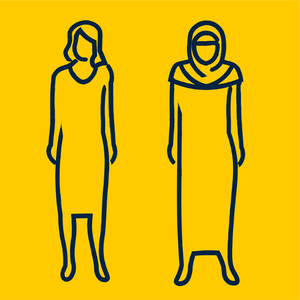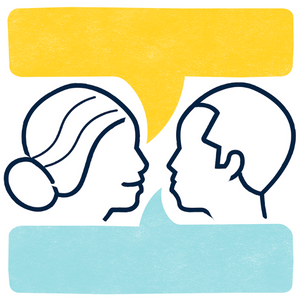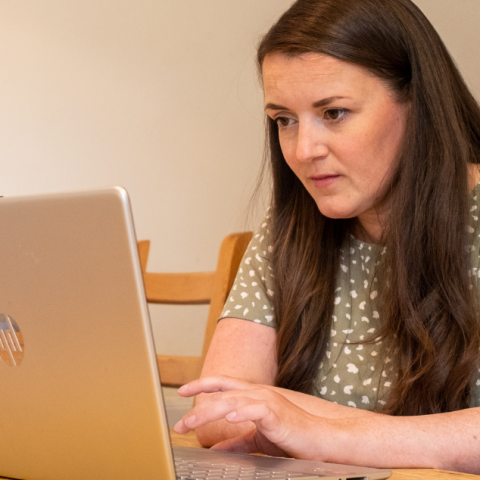Menopause and CF: Let’s talk about it!
What is menopause?
 Understanding and thinking around menopause has grown over time, breaking down important barriers for the health and wellbeing of those going through menopause.
Understanding and thinking around menopause has grown over time, breaking down important barriers for the health and wellbeing of those going through menopause.
So, what is menopause? Menopause is when your periods stop. By definition, you reach menopause when you have not had a period for 12 months. This usually happens due to hormone levels getting lower with age and usually occurs in the general public sometime around 45 to 55 years. Menopause can cause symptoms such as anxiety, mood swings, brain fog, hot flushes, vaginal dryness, irregular periods and reduced sex drive. These symptoms can start years before your periods stop (perimenopause) and carry on afterwards. Menopause can also happen earlier due to surgery that removes the ovaries or the uterus or certain cancer treatments, or for reasons that are unknown.
Postmenopause is the time after the menopause, where the symptoms of menopause may have reduced or stopped, but some people continue to have symptoms for longer. There are treatments, such as hormone replacement therapy (HRT), and lifestyle changes that can help to relieve symptoms at the various stages of menopause. See the NHS website for more information about early menopause, perimenopause and menopause, and postmenopause.
There is a growing number of resources to support people going through the menopause, such as Menopause Matters, Women’s Health Concern, Menopause café, Daisy Network for premature menopause, and Queermenopause for people who identify as LGBTQIA+.
"I am 55 and gone through the menopause …. I have side affects from Kaftrio and don’t know whether its Kaftrio or menopause and don’t know whether I want HRT"
Anonymous, has CF
How does menopause differ for people with cystic fibrosis?
The Cystic Fibrosis Reproductive & Sexual Health Collaborative’s (CFReSHC) guide to menopause reports that people with CF develop perimenopause and menopause symptoms two to three years earlier than people in the general population. Another report found that people with CF started menopause at age 46 years (ranging from 39 to 52 years), compared to age 49 years (ranging from 45 to 52 years) in people without the condition.
People with CF experiencing menopause or perimenopause have reported symptoms such as: early awakening (85% experienced this), night sweats (62%), stiffness or soreness in joints, neck, or shoulder (61%), hot flushes (58%), vaginal dryness (56%), sleep-onset insomnia (52%), frequent mood changes (44%) and feeling tense/nervous (38%). Sleep disturbance and symptoms of depression have been reported as the most severe perimenopausal symptoms by people with CF.
The impact of menopause on other aspects of CF is not well known. In the general population, research has found that menopause is linked to a decline in lung function, but this has not yet been investigated in people with CF. Menopause also impacts bone health, which is already an important part of CF care. Bone density is lost rapidly in the first few years after the menopause. Our bone health factsheet has detailed information about bone health in CF. Talk to your CF Team if you have questions or concerns about your bone health.
The physical and emotional symptoms of menopause can impact all parts of your life, including your work. Watch these videos to see how menopausal symptoms have affected different people in the workplace, and what their employers are doing to respond to their needs. Your workplace should support you through the menopause. This could be by providing flexible working options, providing a fan or moving your desk closer to a window, and the option to take rest breaks within the day. Read more advice about menopause in the workplace.
"When I started having hot flushes, they'd wake me up in the middle of the night and I’d have to work out if it was a hot flush, a reaction to the medication, or a hypo*."
Anonymous, has CF
*hypo = hypoglycaemia, when the glucose level in your blood drops too low.
What are the treatment options for menopause?
The main treatment for symptoms of menopause is HRT to restore the drop in hormone levels. HRT can help relieve most menopausal symptoms. Taking HRT can reduce the risk of osteoporosis, which is a risk for those with CF. There are benefits and risks for anyone taking HRT, which depend upon the type of HRT and how long it is taken for. HRT is not safe for everyone, which will depend on things like your family’s medical history. There are different types of HRT available. You should talk to your GP or CF team about which options might be safe and suitable for you. Read more about HRT and the alternatives to HRT.
The symptoms of menopause can occur for other reasons that are not linked to the menopause. Your GP and CF team will be able to help you work out if this is the case and what can be done.
"I'm not old enough yet but very worried about it - never thought I'd make it that far"
Anonymous, has CF
I have CF and am experiencing symptoms of the menopause at the moment; do you have any tips to help?
Beside HRT, there are other things you could try to help your symptoms, including:
- Get plenty of rest and try to keep a regular sleep routine.
- Eat a healthy diet and talk to your CF team about dietary supplements, such as Vitamin D for bone health. Check out the Association of UK Dietitians advice for menopause.
- Exercise regularly and try relaxing activities, like meditation and mindfulness, to help mood changes.
- Try to get some sunlight on your skin, as this triggers the production of Vitamin D and helps keep your bones healthy.
- Keep your bedroom cool at night, try a lighter duvet, or a cooling pillowcase to help with hot flushes and night sweats.
- Try vaginal lubrications to help with vaginal dryness.
- Talk to friends, families and colleagues going through the same thing, or use our Forum to reach out to people with CF experiencing the same thing.
- Try to reduce your stress levels as much as possible, speak to your CF team for ways to help.
- Cut down on alcohol and caffeine.
- Stop smoking.
Make sure you talk to your CF team if you are experiencing symptoms of menopause. They can explain in greater detail how menopause will affect you, your care, and what treatment options are available to you.
To hear more on getting older with CF, catch up on our latest CF LIVE here. For more information on menopause and CF, visit Cystic Fibrosis Reproductive & Sexual Health Collaborative’s (CFReSHC) guide to menopause. We’d love to hear your thoughts and experiences of menopause and CF, if you would like to get in touch or share your story, you can email us at [email protected].
Cystic fibrosis (CF) is a genetic condition which causes sticky mucus to build up in the lungs and digestive system. It affects more than 10,800 people in the UK. One in 25 of us carries the faulty gene that causes it, usually without knowing.
Your donations help us fund vital research. Donate today to help everyone with CF live a life unlimited.

Sign up to our newsletter
Get the latest news on what the Trust and our supporters are doing, straight to your inbox.
